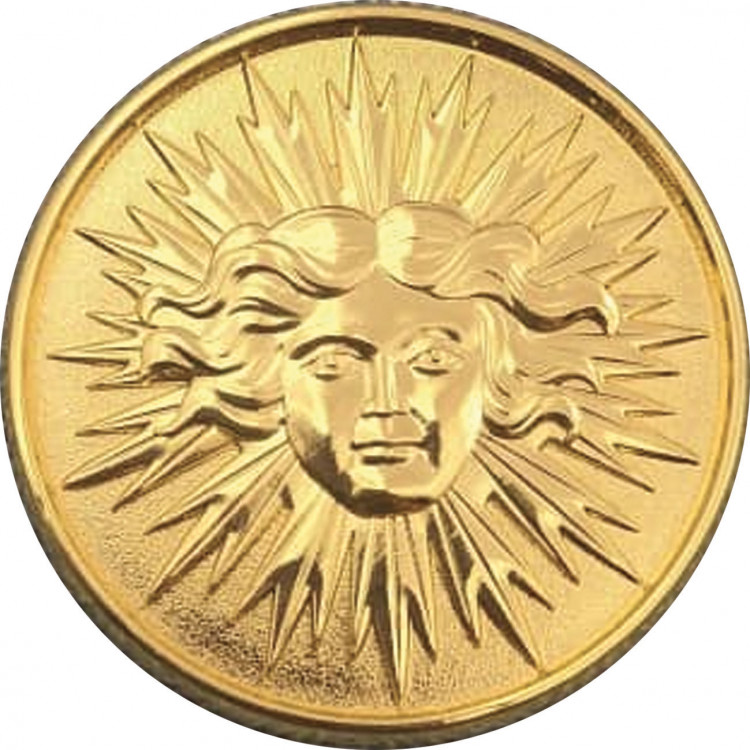









Louis XIV mobile coin. Louis XIV, known as “the Great” or “the Sun King”, born September 5, 1638 at Château Neuf in Saint-Germain-en-Laye and died September 1, 1715 in Versailles, is a king of France and Navarre. His reign extends from May 14, 1643 - under the regency of his mother Anne of Austria until September 7, 1651 - until her death in 1715. His reign, lasting 72 years, is one of the longest in the history of Europe and the longest in the history of France. Born Louis, nicknamed Dieudonné, he ascended the throne of France upon the death of his father, Louis XIII, a few months before his fifth birthday, which made him one of the youngest kings of France. He thus becomes the 64th king of France, the 44th king of Navarre and the third king of France from the Bourbon dynasty. If he does not like the fact that his main Minister of State, Colbert, refers to Richelieu, Minister of Louis XIII and an uncompromising supporter of royal authority, he nevertheless fits in with his project of secular construction of absolutism. of divine right.
Usually, his reign is divided into three parts: the period of his minority, troubled by the Fronde, from 1648 to 1653, during which his mother and Cardinal Mazarin rule; the period from the death of Mazarin, in 1661, to the beginning of the 1680s, during which the king governed by arbitrating between the great ministers; the period from the beginning of the 1680s to his death, when the king governed more and more alone, notably after the death of Colbert, in 1683, then of Louvois, in 1691. religion, notably under the influence of his second wife, Madame de Maintenon. His reign saw the end of the great nobiliary, parliamentary, Protestant and peasant revolts which marked the previous decades. The monarch imposes obedience to all orders and controls currents of opinion (including literary or religious) more cautiously than Richelieu. France was, during his reign, the smallest country in Europe, which gave it a certain power, especially since, until the 1670s, the economy was doing well thanks in particular to the country's economic dynamism and to public finances in order. Through diplomacy and war, Louis XIV asserts his power in particular against the House of Habsburg, whose possessions surround France. Its policy of the “pre-square” seeks to enlarge and rationalize the borders of the country, protected by the “iron belt” of Vauban, which fortifies the conquered cities. This action allows him to give France borders approaching those of the contemporary era, with the annexation of Roussillon, Franche-Comté, Lille, Alsace and Strasbourg. However, wars weighed on public finances and Louis XIV attracted suspicion from other European countries, which often joined forces at the end of his reign to counter his power. It is also the moment when, after the Glorious Revolution, England begins to assert its power, in particular maritime and economic, under the reign of a determined adversary of Louis XIV, William of Orange.
From a religious point of view, the 17th century is complex and is not limited to the opposition between Catholics and Protestants. Among Catholics, the question of grace arouses strong opposition between the Jesuits and the Jansenists. Louis XIV had to decide between the various currents of religious thought, taking into account not only his own convictions, but also political considerations. Thus, if he condemns the Jansenists, it is also because he is wary of their anti-absolutism. Concerning the Protestants, if the revocation of the Edict of Nantes in 1685 is generally well received in France, the reactions in Europe and Rome are more attracted. Relations with the papers are generally bad, especially with Innocent XI. Indeed, the king intends to preserve his independence and that of his clergy vis-à-vis Rome, which does not prevent him from being wary of the Gallicans, often welcomed by Jansenism. At the end of the reign, the quarrel over Quietism also led to tensions with Rome. From 1682, Louis XIV ruled his kingdom from the vast Palace of Versailles, whose construction he directed and whose architectural style inspired other European castles. His court subjects the nobility, closely watched, to a very elaborate etiquette. The cultural prestige is affirmed there thanks to the royal patronage in favor of artists such as Molière, Racine, Boileau, Lully, Le Brun and Le Nôtre, which favors the apogee of French classicism, qualified, from his lifetime, of " Grand Siècle ”, or even“ century of Louis XIV ”.
His difficult end of reign was marked by the exodus of persecuted Protestants, by military setbacks, by the famines of 1693 and 1709, which left nearly two million dead, by the Camisards revolt and by the numerous deaths. of his royal heirs. All his dynastic children and grandchildren died before him, and his successor, his great-grandson Louis XV, was only 5 years old when he died. However, even after the fairly liberal regency of Philippe d'Orléans, absolutism endured, thus attesting to the solidity of the regime built. After the death of Louis XIV, Voltaire was partly inspired by him to develop the concept of enlightened despotism. In the 19th century, Jules Michelet was hostile to him and insisted on the dark side of his reign (dragonnades, galleys, food shortages, etc.). Ernest Lavisse will be more moderate, even if his school books insist on the king's despotism, and on certain tyrannical decisions. In the second half of the 20th century, Marc Fumaroli considered Louis XIV as the “patron saint” of the cultural policy of the Fifth Republic in France. Michel from Greece points out his shortcomings, while François Bluche and Jean-Christian Petitfils rehabilitate him. Louis XIV mobile coin.
7 other products in the same category: